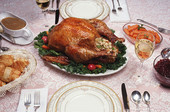
THURSDAY, Nov. 27, 2014 (HealthDay News) — Planning on seconds at Thanksgiving Day dinner this year? If you suffer from chronic heartburn — clinically known as gastroesophageal reflux disease (GERD) — a few steps may help minimize the aftereffects.
Dr. Jordan Josephson, an ear, nose and throat specialist at Lenox Hill Hospital in New York City, offers up these tips to help manage GERD on Thanksgiving:
- Pace yourself. Rather than have one big meal, have at least two small meals throughout the day. It’s also a good idea to have a healthy snack of veggies before the main course is served.
- Don’t eat just before bedtime. Bigger meals should be eaten at least three hours before going to sleep to avoid an acid reflux flare-up.
- Opt for water. Rather than soda or wine, drink water to avoid aggravating your symptoms. Drinking plenty of water will also aid in digestion and help you stay hydrated.
- Limit certain foods. Do not overindulge on carbohydrates like bread, pasta and rice. It’s also a good idea to avoid spicy or tomato-based foods as well as foods high in fat.
- Avoid caffeine. To prevent a flare-up of GERD symptoms, pass on the coffee or other caffeinated beverages.
- Don’t smoke. Smoking irritates the lining of the stomach, esophagus, nose and sinuses.
- Leave the belt at home. Tight or restrictive clothing or accessories can increase heartburn-related discomfort.
- Walk. Taking a stroll before or after Thanksgiving dinner can aid in digestion and boost metabolism.
- Gargle with salt water. At the end of the day, gargling with salt water can help remove acid and soothe stomach irritation.
More information
The U.S. National Institutes of Health provides more information on GERD.
Copyright © 2026 HealthDay. All rights reserved.
